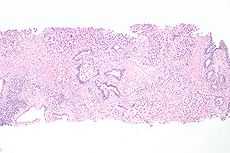Urethral cancer
| Urethral cancer | |
|---|---|
 Micrograph of a urethral cancer, urothelial cell carcinoma, found on a prostate core biopsy. H&E stain. | |
| Classification and external resources | |
| Specialty | Oncology |
| DiseasesDB | 31473 |
| eMedicine | med/3080 |
| NCI | Urethral cancer |
| MeSH | D014523 |
Urethral cancer is cancer originating from the urethra. Cancer in this location is rare, and the most common type is papillary transitional cell carcinoma.[1]
Symptoms
Symptoms that may be caused by urethral cancer include:
- Bleeding from the urethra or blood in the urine.
- Weak or interrupted flow of urine.
- Urination occurs often.
- A lump or thickness in the perineum or penis.
- Discharge from the urethra.
- Enlarged lymph nodes in the groin area.
- Most common site being bulbomembranous urethra.
Risk factors
The main medical risk factors are having bladder cancer or having conditions that cause chronic, inflammation in the urethra. People over the age of 60 and white women have the highest risks.
Diagnosis
Diagnosis is established by transurethral biopsy. Types of urethral cancer include transitional cell carcinoma, squamous cell carcinoma, adenocarcinoma, and melanoma.
Treatment
Surgery is the most common treatment for cancer of the urethra. One of the following types of surgery may be done:
- Open excision surgery.
- Electro-resection with flash surgery.
- Laser surgery.
- Cystourethrectomy surgery.
- Cystoprostatectomy surgery.
- Anterior body cavity surgery.
- Incomplete or basic penectomy surgery.
Chemotherapy is sometimes used to destroy urethral cancer cells. It is a systemic urethral cancer treatment (i.e., destroys urethral cancer cells throughout the body) that is administered orally or intravenously. Medications are often used in combination to destroy urethral cancer that has metastasized. Commonly used drugs include cisplatin (Platinol®), vincristine (Oncovin®), and methotrexate (Trexall®).
Side effects include anemia (causing fatigue, weakness), nausea and vomiting, loss of appetite, hair loss, mouth sores, increased risk for infection, shortness of breath, or excessive bleeding and bruising.[2]
See also
- Anterior urethral cancer
- Carcinoma of the penis
References
- ↑ Ries, LAG; Young, JL; Keel, GE; Eisner, MP; Lin, YD; Horner, M-J, eds. (2007). "SEER Survival Monograph: Cancer Survival Among Adults: US SEER Program, 1988-2001, Patient and Tumor Characteristics". SEER Program. NIH Pub. No. 07-6215. Bethesda, MD: National Cancer Institute. pp. 251–262. Retrieved 18 October 2013.
|chapter=ignored (help) - ↑ Urethral Cancer Treatment
| ||||||||||||||||||||||||||||||||||||||||||||||||||||||